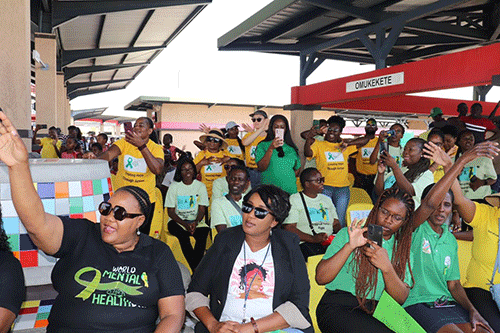Paheja Siririka
Victoria Kaapanda
Nearly 520 000 people in Namibia are suffering from at least one type of mental illness.
Specialist psychiatrist Admasu Moges said this number is very alarming, and cannot be ignored.
Moges shared these statistics on Friday during the commemoration of World Suicide Prevention and Mental Health Day hosted in Oshakati under the theme “Mental Health is a Universal Human Right”.
Mental health lecturer at the University of Namibia, Anna Haifete, said alcohol affects the part of your brain that controls inhibition, so you may feel relaxed, less anxious and more confident after a drink.
“But these effects quickly wear off. The chemical changes in your brain can soon lead to more negative feelings, such as anger, depression or anxiety, regardless of your mood,” she added.
Haifete said alcohol problems and mental ill-health are closely linked, stressing that people who drink alcohol are more likely to develop mental health problems.
“It is also true that people with severe mental illness are more likely to have alcohol problems. This may be because they ‘self-medicate’, meaning they drink to deal with difficult feelings or symptoms,” continued the psychiatrist.
Stigma
Psychiatrist Dr. Hileni Ndjaba said there are quite a number of patients who are rejected by their families, and this form of stigma is uncalled for.
“Rejection is one form of stigma that we have seen among our patients who suffer from mental illness. People associate mental illness with craziness or madness, and this further exacerbates the situation,” she stated.
Ndjaba said the stigma is so deep that even the mental health facility which caters for the rehabilitation of patients is associated with the illness.
“It is only recently that I found out about ‘Groendak’ (green roof), which refers to our building here, which is known for treating mental illnesses,” she noted.
She advised those suffering from mental illness not to give up on their treatment because of stigma.
“It is your human right to seek help. This is about raising awareness on mental health, and how to take care of yourselves,” Ndjaba urged.
Observed on 10 October every year, the World Health Organisation (WHO) states that this year’s Mental Health Day is an opportunity for people and communities to unite, raise awareness, and drive actions that promote and protect everyone’s mental health as a universal human right.
The WHO says everyone has a right to the highest attainable standard of mental health, including the right to be protected from mental health risks; the right to available, accessible, acceptable and good quality care; and the right to liberty, independence and inclusion in the community.
Suicide statistics
At the same event, Moges revealed that the Namibian Police recorded 615 suicides between 20 to 22 January and April.
“Of these staggering statistics, 485 are adult men, while 107 are adult women. The Omusati region has the highest suicide cases with 121, while the //Kharas region reported the lowest with eight cases,” said Moges.
The statistics showed that 25 000 Namibians attempted to commit suicide in 2015, while 467 succeeded in ending their lives between April 2022 and 31 March.



